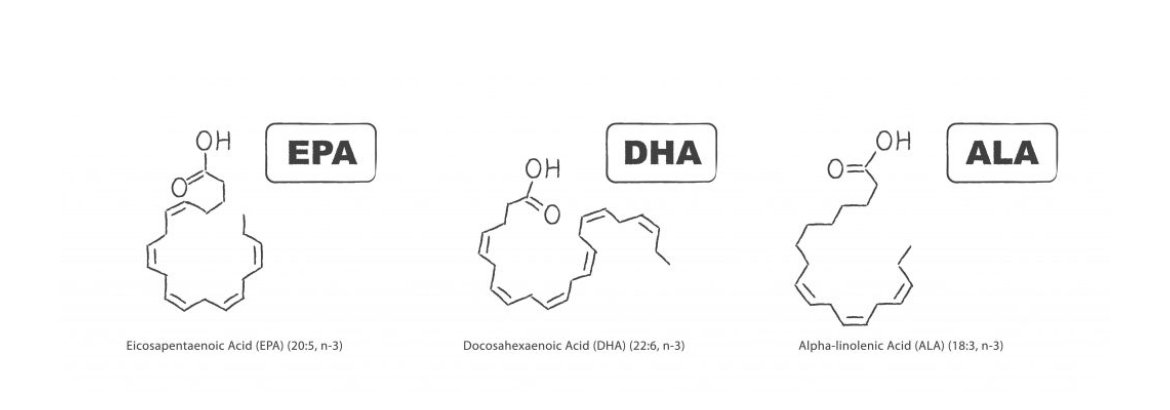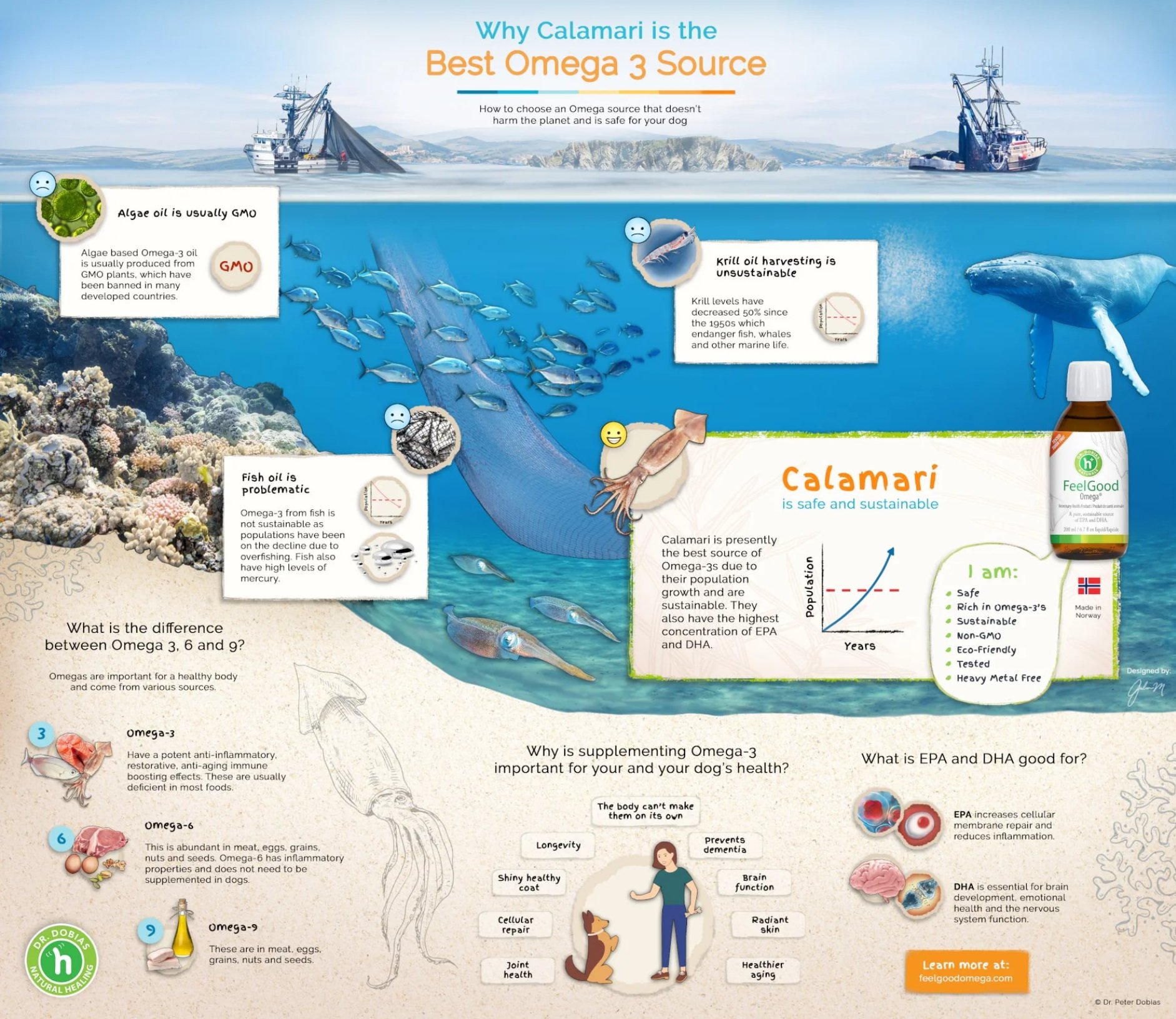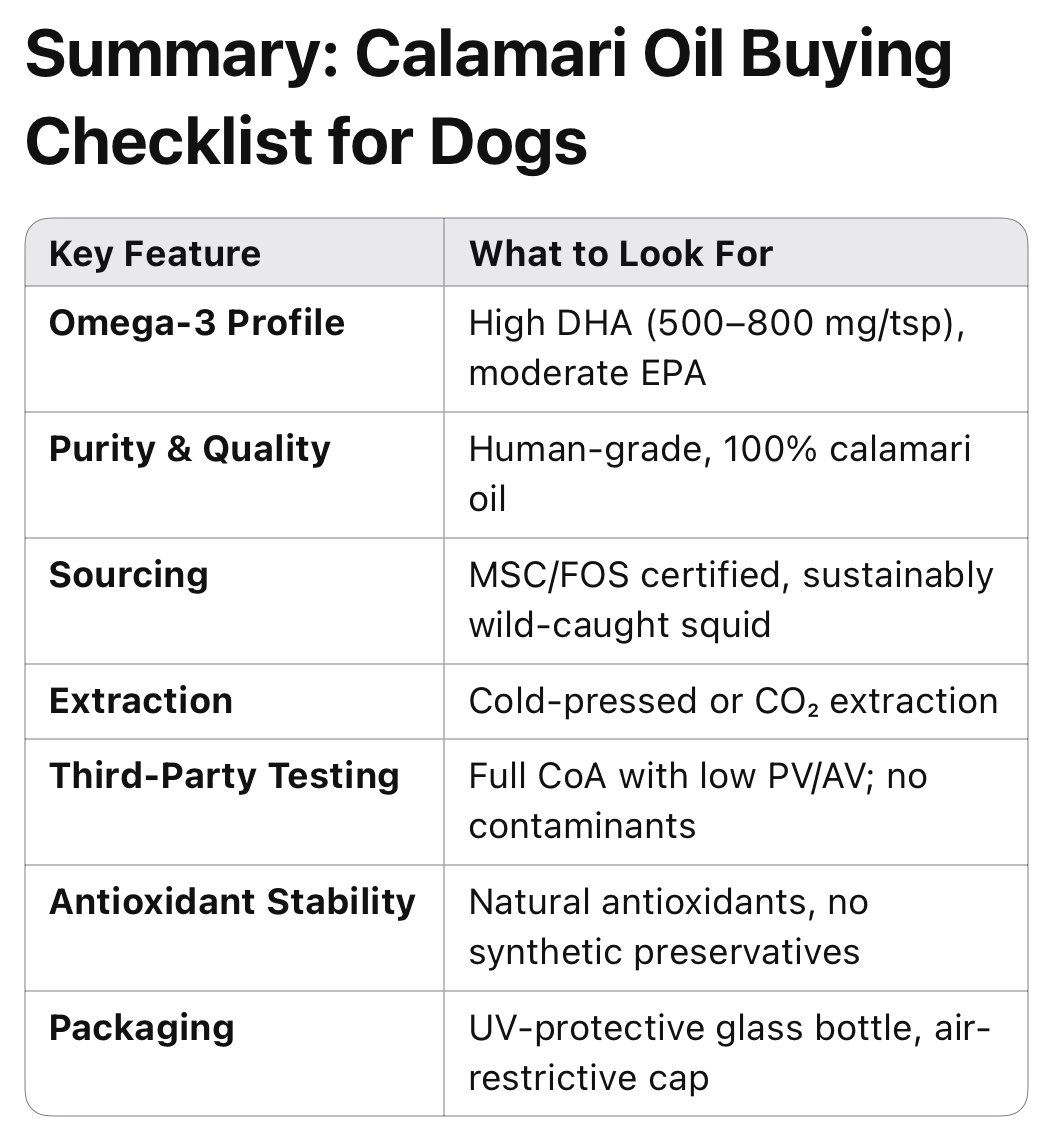Calamari Oil
Quick Summary: Calamari oil is an eco-conscious marine omega-3 source derived from squid, often using byproducts from human food production. Rich in DHA and EPA, it offers high bioavailability and supports brain, eye, skin, joint, and heart health. Squid reproduce rapidly, have short lifespans, and are fished using low-impact methods—making calamari oil a more sustainable alternative to fish, krill, or seal oil. Ideal for pet parents seeking marine-based omega-3s with a lower environmental footprint.
Calamari Oil for Dogs: A Sustainable and Nutrient-Rich Omega-3 Source
As the demand for omega-3 supplementation in dogs increases, so does concern about the environmental impact of conventional marine sources like salmon and krill oil etc. Calamari oil—derived from squid—has emerged as a more sustainable, bioavailable, and nutrient-dense alternative, offering both ecological and nutritional benefits for canine health.
What Is Calamari Oil?
Calamari oil is extracted from squid, particularly from species already being harvested for human consumption. Rather than catching squid solely for oil production, manufacturers often use byproducts such as mantles, tentacles, and viscera—making the process more resource-efficient and reducing waste.
This “zero waste” approach aligns with circular economy principles, setting calamari oil apart from less sustainable options such as krill or seal oil, where entire animals are often harvested exclusively for their oil content.
Sustainability Profile of Calamari Oil
Squid present unique ecological advantages:
Short life cycle: Squid generally live only 1–2 years and reproduce prolifically. This rapid turnover allows populations to rebound quickly, even with moderate fishing pressure.
Lower trophic level: Unlike larger, predatory fish, squid sit lower on the food chain. Harvesting them has less disruptive impact on marine ecosystems.
Byproduct sourcing: Many calamari oils are produced from leftovers of squid processed for food, rather than freshly caught specimens.
According to the International Council for the Exploration of the Sea (ICES), squid fisheries in some regions are well-monitored with management strategies including:
Catch quotas
Seasonal harvests
Low-impact fishing methods like jigging, which reduces bycatch and seabed disruption
As awareness grows around the environmental impact of traditional fish oils, many pet parents are seeking more sustainable ways to support their dogs’ health. Calamari oil, derived from squid, is emerging as a highly sustainable, bioavailable, and nutrient-rich alternative to conventional marine oils like salmon, krill, or seal oil.
Squid offer unique ecological advantages. They have a naturally short lifespan, typically living only one to two years, and reproduce prolifically, allowing populations to recover quickly even with fishing pressure (Arkive). This rapid lifecycle makes squid a more resilient marine resource compared to longer-lived species. Additionally, squid generally occupy a lower trophic level than larger predatory fish, meaning their harvesting has a relatively smaller ecological impact on marine food webs.
Another key sustainability advantage is that a large proportion of calamari oil is sourced from squid already being harvested for human consumption. By using the by-products such as mantles, tentacles, and viscera, the oil production process maximises resource use and reduces waste, aligning with circular economy principles. This is an important distinction from oils like krill or seal oil, where whole organisms are often harvested specifically for oil extraction, raising significant ecological concerns.
Research supports that the sustainability of calamari oil hinges largely on responsible fishery management. In some regions, squid fisheries are robustly monitored, with stock assessments, harvesting quotas, and selective fishing techniques like jigging that minimise bycatch and habitat damage (ICES). Choosing calamari oil products from suppliers who source from well-managed, certified sustainable fisheries is crucial. Certifications like those from the Marine Stewardship Council (MSC) are still developing for squid fisheries but serve as an important benchmark for environmental responsibility.
Dr. Peter Dobias’s calamari oil is often highlighted as a product that exemplifies these sustainability commitments. Companies prioritising responsible sourcing select squid from regions with healthy, well-monitored populations and often utilise squid caught through low-impact methods such as jigging. Transparency about supply chain practices and the use of squid byproducts further enhance the sustainability profile of such products.
While full Marine Stewardship Council (MSC) certification is still being developed for most squid fisheries, the principles of responsible sourcing are well established. Consumers should look for brands that disclose their fishing methods and sustainability practices.
.
Nutritional Benefits of Calamari Oil for Dogs
Calamari oil is especially high in DHA (docosahexaenoic acid) and EPA (eicosapentaenoic acid), two long-chain omega-3 fatty acids which as you’ll know by now, are vital to canine health.
Research in human nutrition indicates calamari oil may offer higher DHA concentrations than most standard fish oils. For example, a study in the Journal of Lipid Research found that omega-3s from squid liver oil demonstrated high levels of DHA content and bioavailability. While more canine-specific studies are needed, this suggests that calamari oil may be better absorbed and utilised than some other marine-based alternatives.
What to Look for in a Calamari Oil Supplement
If you’re considering calamari oil for your dog, here’s what to check before purchasing:
Sourcing Transparency
Ensure the company clearly states where and how the squid are harvested.
Look for use of byproducts rather than whole-animal extraction.
Fishing Method
Jig-caught squid and selective harvesting techniques reduce environmental impact.
Purity and Stability
Confirm that the oil is molecularly distilled or tested for heavy metals, dioxins, and PCBs.
Look for oxidation control, such as nitrogen flushing and UV-protective packaging.
Independent Testing
Reputable brands should offer third-party test results for purity, freshness, and omega-3 concentration.
Sustainability Commitment
Look for brands aligned with sustainability standards or third-party verified through emerging certifications.
Calamari oil offers a compelling alternative to traditional fish-based omega-3 supplements for dogs. Thanks to its superior DHA content, potential for higher bioavailability, and lower ecological footprint, it supports both optimal canine health and marine conservation.
When sourced responsibly—from companies prioritising transparency and sustainability—calamari oil can be a smart, science-backed addition to your dog’s wellness routine.
Top Recommended Brands
For pet parents in the USA and Canada, we recommend FeelGood Omega by Dr. Peter Dobias for its purity, sustainability, and clinical-grade formulation. As of May 2025, I have been unable to find any other Calamari omega supplements that fit our rigorous standards.
As awareness grows around the environmental impact of traditional fish oils, many pet parents are seeking more sustainable ways to support their dogs’ health. Calamari oil, derived from squid, is emerging as a highly sustainable, bioavailable, and nutrient-rich alternative to conventional marine oils like salmon, krill, or seal oil.
Conclusion
In conclusion, calamari oil represents a promising, more sustainable option for providing dogs with essential omega-3 fatty acids. Thanks to the rapid reproduction and lower ecological impact of squid, coupled with responsible sourcing and the use of byproducts, calamari oil may offer a lower environmental footprint compared to traditional fish-based oils. By choosing high-quality products from transparent, environmentally conscious companies, pet owners can confidently support both their dog’s health and the health of our oceans. Continued research into squid populations and fishing practices will only strengthen the role of calamari oil in responsible canine nutrition.
Our top choice would be Dr Peter Dobias’ “Feel Good” Omega for USA & Canada




